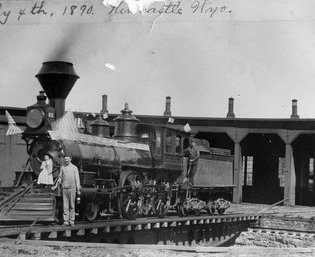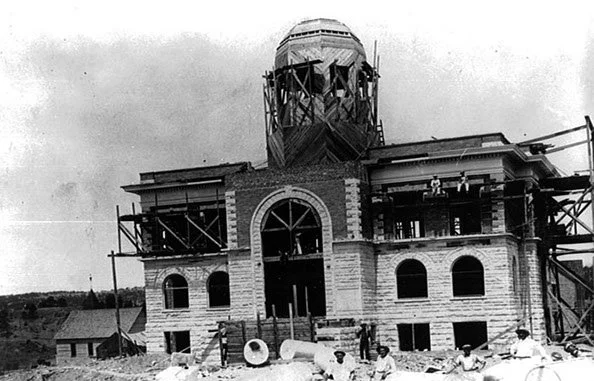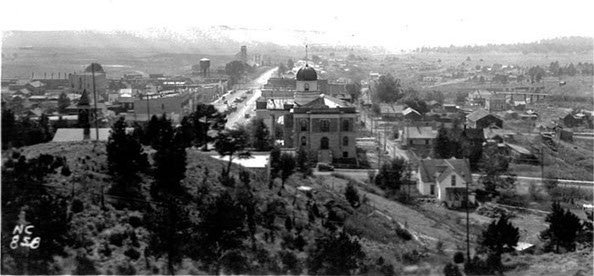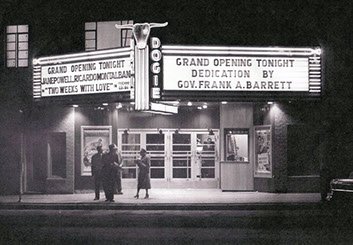EXPLORE NEWCASTLE
Newcastle was founded in 1889, with Frank W. Mondell being elected first mayor at the age of 29. With the expansion of the Chicago, Burlington, & Quincy railroad tracks, Newcastle was right in line. The coal mining supervisor was from Newcastle-Upon-Tyne, England, and gave Newcastle its name. The town appeared to grow until 1900 when smallpox, diphtheria, and scarlet fever caused havoc. But do not underestimate the resiliency of this small town! It rebounded and prospered with dancing halls, brothels, a theater and more.
In 1903, Teddy Roosevelt visited Newcastle, and 2,000 people gathered to listen to him speak. Newcastle is also nationally known for its hand-dug oil well and oil refinery.
A circus — featuring camels, elephants and other creatures — makes its way along Newcastle's Main Street. From the Alice Schuette Collection, Weston County Historical Society.
Newcastle, like so many western towns founded during the rapid expansion of the railroads across the high plains, was a place full of colorful people and colorful stories. A mixture of saloons, dance halls, houses of ill repute and gambling establishments gave cowboys, miners and railroad workers endless opportunities for leisurely pursuits and a way to spend their hard-earned wages.
A railroad roundhouse was constructed in Newcastle, which became a part of the divisional headquarters for Kilpatrick Brothers & Collins. The additional structure they built would serve temporarily as a community hall, schoolhouse and church. Water to the community was hauled in by the barrel for some time until a permanent, seven-mile pipeline was constructed to connect Newcastle to waters in the Cambria Canyon.
Newcastle boasted a population of about 1,000 by 1892. A smallpox epidemic in 1900, along with diphtheria and scarlet fever epidemics, impacted the growing town, but even these could not halt its growth, as necessities like a hospital, theaters and an armory sprung up as time passed.
On May 25, 1903, President Teddy Roosevelt visited Newcastle. From an elaborate platform built for the occasion, the President gave a speech to hundreds of local fans. The platform was built at the intersection of Warren Avenue — today’s Main Street — and Seneca Street.
The visit of Roosevelt was a short, but highly anticipated, event. He was very popular in Weston County and residents came from all corners of the county to get a glimpse of and hear from the famous Rough Rider-turned-President. Some Weston County residents had even served with Teddy and his Rough Riders in the Spanish-American War.
Weston County Courthouse under construction.
Aerial view of Newcastle.
The population of Newcastle, which had been 756 in 1900, grew steadily until reaching 3,395 by 1950 thanks to employers like the Wyoming Refining Company’s oil refinery on Main Street, as well as a pair of coal mines. These industries, as well as a burgeoning tourism, continue to bolster the local economy today. Many cattle ranches maintain century-old operations in the Newcastle area, as well.
Explore Newcastle’s
Historic Greenwood Cemetery
Download your Walking Tour Guide!
Take a Walk
Take a Walking Tour of Historic Newcastle
The Dogie
In 1950, Esther (Shorty) Shenton made plans to build a new, modern movie theater in Newcastle. The new theater was to boast updated projection equipment and a new sound system, which was complimented by luxurious, fireproof carpets and stage drapes, special devices for deaf and hard of hearing clientele, and a clear plastic viewing screen.
The floor plan of the theater was crafted in the shape of a saucer that would allow a perfect line of sight for all viewers. And the facility featured state-of-the-art air conditioning and heating systems, a snack bar and even a special cry-room for babies.
A contest to name the new theater was held, and the name Dogie Theater was chosen, in honor of the Newcastle High School mascot. A “dogie” is a motherless calf in a range herd of cattle and must be strong to survive.
The grand opening was held March 21, 1951, under the ownership of the Black Hills Amusement Company. Judge Ilslely was master of ceremonies, Mayor Ty Thomas gave the welcome, the Newcastle High School Band played, the Newcastle Male Chorus sang and Wyoming Governor Frank Barrett gave the dedicatory address.
About 450 advanced tickets at 65 cents each were sold for the grand opening. The movie Two Weeks In Love, starring Jane Powell and Ricardo Montalban, was the featured film. The Weston County Historical Society and Museum District staged a reenactment of the grand opening for the theater’s 50th anniversary in 2001.











